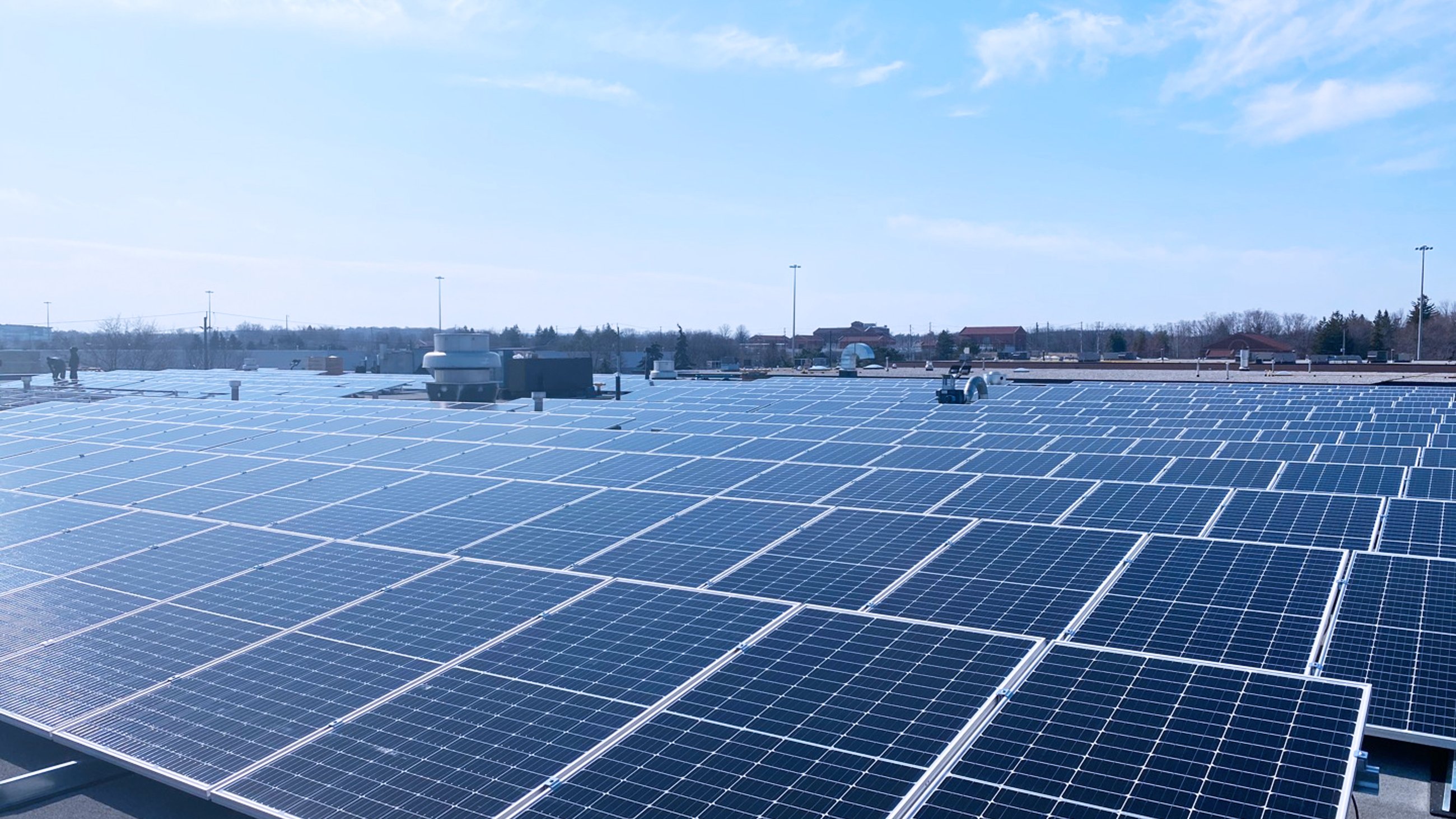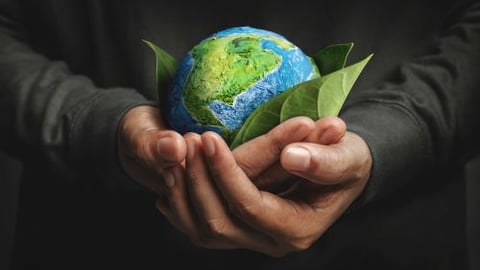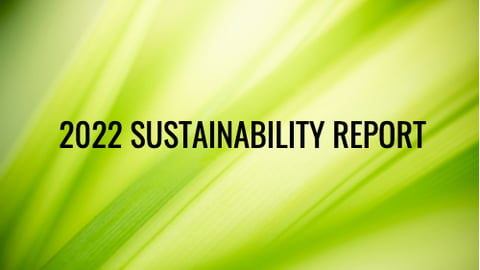2024 Sustainability Report: Working together towards a greener future

How are c-stores and their suppliers showing up for the planet? It’s a critical question for the sustainability of the world’s resources, as well as for addressing the global climate crisis. But the question goes beyond an ESG framework. At a granular level, it is about empowering consumers to make better choices about where they shop and what they buy, so that they can live sustainable lifestyles and contribute to the health of the planet.
According to Kantar’s Sustainability Sector Index, 79% of Canadians want to live a sustainable lifestyle. The reality, however, is only 21% are actively changing their behaviour.
“The gap between what consumers value and how they behave, referred to as the value-action gap at Kantar, can be closed over time; however, it does require intentional efforts by brands to make sustainable habit building easier and more valuable in the lives of consumers,” says Margaret McKellar, senior vice-president, client partner at Kantar North America, who recently completed the Cambridge Institute for Sustainability Leadership Program.
In fact, she says consumers expect “intentional efforts” now, so much so that their perception of brands “is highly influenced by how they show up in the sustainability space. This evolving market dynamic has prompted an adjustment in corporate ESG strategy from ‘do less harm’ to ‘do more good.’”
Work is underway by c-stores and their suppliers to help consumers adopt sustainable shopping habits. The 2024 Sustainability Report looks at the transitions, innovations and partnerships happening in the c-store sector, from store operations to product packaging.
Smooth operators
When it comes to being a smooth operator in retail today, it is all about having a gentle footprint on the environment. Here, three c-store chains share with Convenience Store News Canada how they’re prioritizing sustainability in their operations.
Rabba Fine Foods
The independent chain, which has 36 locations in the GTA, has installed solar panels across its distribution centres, a move “expected to offset nearly all of the electricity we use annually,” says Rima Rabba, director of marketing at the family-owned company. “This significant investment substantially reduces our reliance on non-renewable energy sources and reduces our carbon footprint.”
The chain has also made changes to in-store packaging to limit single-use plastics on beverages, snacks and other items, and prioritize “sourcing products that are both reusable and recyclable, aligning with our goal to minimize environmental impact.”
Adds Rabba: “By expanding our selection of environmentally friendly brands, we aim to empower customers to make more sustainable choices without compromising convenience or quality.”
It has also forged partnerships with the likes of Darling Ingredients, an Irving, Texas-based company that repurposes and recycles materials from the animal agriculture and food industries. As part of its program with Darling, used cooking oil and animal fats at Rabba Fine Foods are being collected and repurposed to produce renewable, cleaner diesel, allowing the company to “help the environment by using something that would otherwise be considered negligible.”
“By expanding our selection of environmentally friendly brands, we aim to empower customers to make more sustainable choices without compromising convenience or quality.”
Rabba Fine Foods also collaborates with Second Harvest to reduce food waste. The chain uses various channels, including its website, social media platforms and in-store signage, to inform customers about its various sustainability initiatives, and engages them through community events and outreach programs.
“Environmental stewardship is increasingly important to our customers when choosing where to shop,” says Rabba. “They appreciate knowing that their purchases support an independent retailer that prioritizes sustainability and actively works to reduce its environmental footprint.”
KaleMart24
The way c-store entrepreneur Sam Saoudi looks at it, it’s disingenuous in one breath to say that you provide healthier choices at convenience to customers, but then not have a store that operationally walks the talk.
“Sustainability aligns with the values of health and well-being, extending beyond just the products offered to the entire ethos of the company,” explains Saoudi. “By prioritizing eco-friendly practices, KaleMart24 not only enhances its appeal to environmentally conscious customers, but also contributes positively to the planet's health, fostering a more sustainable future for all.”
The first KaleMart24 opened in March in the BERRI-UQAM Metro station in Montreal, and its commitment to “urban sustainability“ was on full display. The 1,400 store features LED lighting throughout; energy-efficient HVAC systems; sustainable materials, including eco-friendly building materials and furnishings, such as recycled or reclaimed wood and steels; and low-VOC paints (VOCs stands for Volatile Organic Compounds, which can pollute the air); and a recycling program which encourages customers to bring reusable coffee cups to reduce the amount of waste generated by the store.
“We seek brands with sustainable sourcing, eco-friendly packaging and ethical standards. Local sourcing and transparency in practices are also emphasized.”
Like Rabba, KaleMart24, which recently opened a second store in Montreal’s Jarry Metro station and has shared plans to have five locations running by the end of the year, is prioritizing suppliers that align with its commitment to healthier choices and environment sustainability.
“We seek brands with sustainable sourcing, eco-friendly packaging and ethical standards. Local sourcing and transparency in practices are also emphasized,” says Saoudi, who is also CEO of Toro Beverages, a brand of sugar-free matcha-based energy beverages. “This approach ensures that KaleMart24's offerings reflect its values while minimizing environmental impact.”
Parkland
Maureen Pellettier boasts an impressive work history in energy efficiency and decarbonization initiatives for several companies, including Suncor.
Since joining Parkland in early 2023 as project manager, environmental, social and governance, Pellettier has built a strategic plan for the Calgary-based retail and energy company to meet its sustainability goals of reducing its Scope 1 and 2 GHG emissions by 40% per site by 2030.
“Our strategy has three pillars: energy efficiency, electrification and decarbonization, and renewables,” she says.
On the first pillar, Parkland is working on implementing a formal energy management system, which will include performance monitoring capabilities related to HVAC. One company it has partnered with uses AI sensors and controls to help improve HVAC performance. An invoice data management project will also help to bring clarity to Parkland’s energy usage.
“We have more than 100 utility providers that are servicing us in Canada,” notes Pelletier. “Once we formalize those two projects [energy management system and invoice data management], we can start to work in areas like demand energy response and time of use as part of our progression towards overall performance management. The amount of work we can do with better data will be incredible.”
At On the Run stores, Parkland is looking at electrifying hot water tanks and boilers, either fully or with a hybrid solution, and as part of decarbonization efforts, has started a unique trial with its car wash operations.
“Even at a very commercial retail level, there are carbon capture technology to investigate,” she says. On the Run with gas stations also ran a successful pilot with EcoTank.
Pellettier stresses the importance of the Parkland Facilities Infrastructure team who handles and leads the maintenance activities of the store. “Parkland is embracing the Drive to Zero in terms of energy and water consumption, emissions, and waste. It is a journey to continue to build a sustained energy management program, and in particular it is a team’s input and support as the foundation to the success of our Parkland journey in sustainability.”
Spotlight on sustainable initiatives
Parkland and EcoTank pilot success in plastic waste reduction
Parkland diverted 12,619 plastic jugs from landfills across 14 locations in 2023 as part of a pilot program with EcoTank Canada, which manufactures windshield washer fluid dispensers that release fluid by the litre directly into a vehicle similar to a fuel pump.
At press time, there were 309 EcoTanks nationwide, with the largest customers of the solution being Sobeys, Irving Oil, Petro-Canada, Parkland and Canadian Tire.
“The EcoTanks are an amenity and drive traffic to the store and that increases other product sales,” says Robbie Mair, EcoTank Canada’s co-founder and CEO. “Combine that with the cost savings of handling, taking up space, stolen inventory, and additional disposal costs of the jugs, there is an overall economical benefit to the operator.”
Its modeling also shows increases of 10% to 20% in overall volume sold of windshield washer fluid per year, versus if a gas station only sells fluid in jugs.
To set up the dispensers, EcoTank charges retailers a small installation fee and then a revenue-sharing model is signed. “We enter into a long-term operating agreement, and they get a percentage of the revenue for effectively letting us put the units on their site,” says Mair. “We manage and service completely hands-free for the operator.”
He says EcoTank Canada has reduced over 100,000 jugs since its official launch with a 7-Eleven store in Orangeville, Ont. in early 2022, and has reduced 36,000 jugs over the last two months.
An average store reduces about 2,000 plastic jugs from landfills over a year, adds Mair.
Progress in packaging
Manufacturers in the refrigerator section have been making packaging innovation announcements over the past six months.
In North America, Flow Beverage will debut this summer a new brand platform and updated packaging for Flow Original followed by Flavoured Water later in the year. The new packaging will make Flow the most sustainable Tetra Pak package, with more than 80% renewable materials (including, for the first time, post-consumer recycled content). The carton will also be sealed with an improved sugarcane-based cap. Flow's new package is also designed to have the lowest carbon footprint to date; seven times lower than glass, four times lower than aluminum, and three times lower than PET.
BlueTriton Brands Canada, whose portfolio include Pure Life and Ac+ion Water, has set a goal for all its bottles to be recycled and recaptured for reuse. Currently, over 70% of BlueTriton products sold in c-stores are 100% recycled PET, says Scott McIntyre, VP and general manager, BlueTriton Brands Canada.
To lead on the collection and recapture, McIntyre says BlueTriton “continues to work with provinces across Canada through the current transition to more producer responsibility for blue box and deposit-return programs,” including through public spaces recycling pilot projects.
All of Coca-Cola’s 500 mL bottles—except for the cap and label—are now made entirely out of recycled (PET) plastic. The rollout started in early 2024 and makes the soft drink giant the first company to launch multiple sparkling beverages in 100% recycled plastic bottles across Canada.
Q&A
Mika Unterman, director of sustainability, capabilities and planning, Canada at The Coca-Cola Company, talks going from circular economics in cannabis to the soft drink sector.
You joined Coca-Cola in summer 2023, following a career in the cannabis sector. When did you start getting interested in the sustainability angle? I was in a product commercialization role, and the more I was bringing new products to market, the more I came to realize that in the cannabis space none of the packaging is being recycled, because it's opaque or it’s too flexible. And that's when I really started to take an interest.
How did you switch gears? I did a lot of self-education and went through a master’s program at the University of Toronto and an additional master's program at Ivy Business School on circular leadership and circular business models. And during that time, I received some grant funding from COIL (Circular Opportunity innovation Launchpad) to trial reuse initiatives within the cannabis space. At the end of that term, I applied for a role at Coca-Cola and that’s when I was able to take all my academic and practical learnings into practice at large scale.
How important is recycled plastic to Coca-Cola sustainable strategy goals? Globally, we want to be using at least 50% recycled material in our packaging by 2030. The biggest challenge to achieving that across North America is simply the supply of recycled PET. All of these bottles that are now 100% recycled PET is the equivalent of 172 million bottles, enough to wrap around the moon. It represents 7,000 metric tonnes of CO2 that we’re taking out on an annual basis, which is like removing 1,600 cars off the road every year. And so, there is much to gain in terms of reducing the amount of virgin plastic that we use.
How is Coca-Cola looking to meet its collection goal of every bottle sold at convenience? The individual consumption or immediate consumption that happens at the convenience store is significant. But I will tell you that Canada has been very, very ambitious. Our bottler has been very ambitious around sustainability and really asking the Coke system for as much as they can from PET.”
Sustainability + Buy Local Report: Your customers expect action
Two-thirds of shoppers indicate a possibility they would switch stores based on sustainability, according to new data from the 2024 C-store IQ National Shopper Study.
Convenience Store News Canada asked more than 2,000 c-store shoppers across the country to weigh in on sustainability issues.
As price takes centre stage in the value chain, data shows that 68% of shoppers are likely to switch stores, compared to 74% of shoppers in the 2023 report.
That said, sustainability remains a top priority for c-shoppers coast to coast, who say that donating food, offering recycling containers, local products and working towards zero waste are the most important ways retailers can demonstrate commitment to the planet and its people.
When working to attract the key female consumer, keep in mind that 76% of females value ethical sourcing policies, compared to 69% of male shoppers. How else do they differ?
- Recycling containers for local use: 82% of females vs. 77% of males
- Reusable bag incentives: 76% of females vs. 72% of males
- Donate food instead of throwing it out: 87% of females vs. 79% of males
- Locally sourced products: 82% of females vs. 77% of males
It’s worth noting that there are regional differences in attitudes towards sustainability. For instance, when it comes to eliminating plastic bags/packaging, shoppers in different provinces place a range of value on this action:
· British Columbia (78%)
· Alberta (63%),
· Ontario (71%)
· Quebec (77%)
· Atlantic (70%)
However, across Canada and across the ages, c-store shoppers place a premium on buying local. Shoppers are continuing to buy local at rates comparable to 2023, with two-thirds doing so to demonstrate support for businesses in their communities, a significant increase.
This article was originally published in the May/June 2024 issue of Convenience Store News Canada.
Tell us about your company's sustainability efforts.
Nominations close May 31 for the 2024 CSNC Impact Awards. Winners will be profiled in the print magazine and online!




















